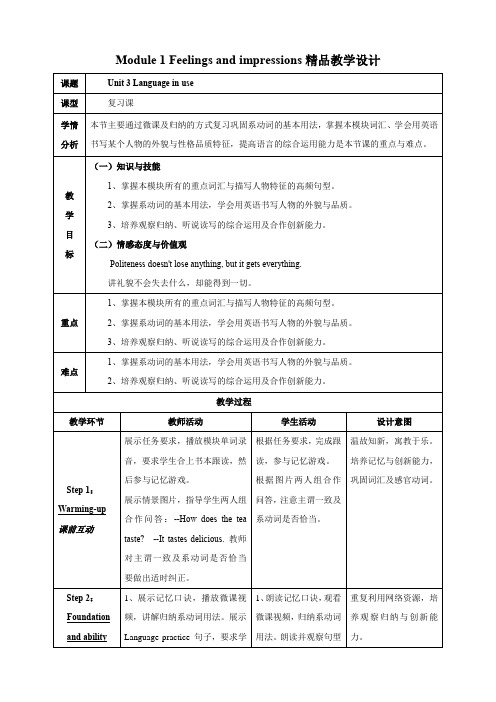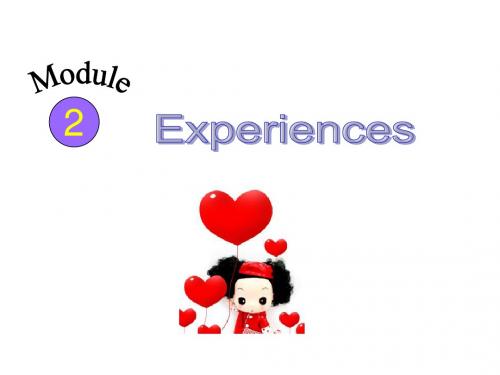Module 2 Experiences Unit 3 Language in use 教案4-优质公开课-外研八下精品
2020-2021学年外研版英语八年级下册Module4Unit3Languageinuse教案

(五)总结回顾(5分钟)
今天的学习,我们了解了过去进行时态的基本概念、重要性和应用。同时,我们也通过实践活动和小组讨论加深了对过去进行时态的理解。我希望大家能够掌握这些知识点,并在日常生活中灵活运用。最后,如果有任何疑问或不明白的地方,请随时向我提问。
三、教学难点与重点
1.教学重点
(1)过去进行时态的构成及其用法:本节课的核心语法内容是过去进行时态,重点是使学生掌握was/were doing的构成,并能熟练运用于描述过去某个时间点正在进行的动作。例如:At 8 o'clock last night, she was watching TV.
(2)动词词组的运用:教授学生如何运用动词词组描述过去正在进行的动作,如was playing football, was having dinner等。
(3)重点词汇和短语:掌握本节课的重点词汇和短语,如discussion, excitement, suddenly, at that moment等,以便在实际语境中灵活运用。
2.教学难点
(1)过去进行时态与一般过去时的区别:学生容易混淆过去进行时态和一般过去时,需要通过实例对比讲解,帮助学生明确两者在用法上的区别。如:I was watching TV when he came yesterday.(过去进行时)VS I watched TV yesterday.(一般过去时)
(4)跨文化交际意识的培养:学生在学习英语时,往往容易忽略中西方文化差异。教师需通过举例、讨论等方式,引导学生了解并尊重不同文化背景下人们交流方式的特点。
四、教学流程
初中英语外研版八年级下册《Unit3 Language in use》教学设计

学
目
标
(一)知识与技能
1、掌握本模块所有的重点词汇与描写人物特征的高频句型。
2、掌握系动词的基本用法,学会用英语书写人物的外貌与品质。
3、培养观察归纳、听说读写的综合运用及合作创新能力。
(二)情感态度与价值观
Politeness doesn't lose anything, but it gets everything.
10、要求学生快速阅读Around the world.。
10、指导学生根据实际情况描述本班的某个同学(可使用Unit 2的课后作业),由其他同学竞猜。完成Module task。
1、朗读记忆口诀,观看微课视频,归纳系动词用法。朗读并观察句型结构。
2、根据图文提示完成Activity1并相互核对答案。
3、书写描述自己的句子,并朗读分享,完成Activity 2.
4、观看例句,辨析look like 与be like,完成词语归类,核对答案。
5、两人组合作对话完成Activity4。
6、独立完成Activities 5-6中的填空题,多媒体展示核对答案。
7、大胆创新,写出合适的句子,朗读交流, 完成Activity 7。
Module 1 Feelings and impressions精品教学设计
课题
Unit 3 Language in use
课型
复习课
学情分析
本节主要通过微课及归纳的方式复习巩固系动词的基本用法,掌握本模块词汇、学会用英语书写某个人物的外貌与性格品质特征,提高语言的综合运用能力是本节课的重点与难点。
6、要求学生独立完成Activities 5-6中的填空题,多媒体展示部分学生答案予以点评鼓励。
外研版英语八年级下Module2 Unit3Language in use课件(共49张ppt)

competition.
4. He/She _____________________ by train. 5.He/She ______________________ the seaside. 6.He/She ______________________ seafood. 7.He/She ______________________ for his/her parents.
Palace Museum
I have ever been to the Palace Museum.
Hong Kong Disneyland
They have visited Hong Kong Disneyland.
Roast duck
not eat; roast duck
hasn’t eaten Beijing roast duck The boy _______________________________.
2
Unit 3 Language in use
Lead in
1.Read and recite the words in Module 2. plete the sentences with the words in the box.
Speaking
I can’t play computer games now, because I haven’t…
Complete thedo in China to help you. Things to do in China! go to Beijing
see the Beijing Opera
climb the Great Wall
以上句子的谓语动词有一个共同的特点就是“have/has+动词
外研版英语八下module2Unit3Languageinuseword教案

Module 2 FriendshipUnit 3 Language in use【学习目标】一、能够掌握宾语从句的大体用法。
二、能用宾语从句进行听、说、读、写。
3、能在学习语法的进程中,学会一些区分与归纳的学习方式。
【课前准备】学生课前齐读本模块的辞汇。
两人一组检查辞汇掌握情况。
【学习进程】一、新知导入。
(1)介绍:a. I know that your father is a doctor.Betty thinks that it is going to rain this afternoon.b. He asks whether/if we’ll go fishing on Sunday.He doesn’t know whether /if they will plant trees on Saturday or not.c. He asks where the nearest book shop is.Can you tell me how I can get to the station?(2)归纳:请仔细观察以上例句,回答下列问题:以上三组例句均属宾语从句, 宾语从句由哪些连词引导?二、语法讲解:宾语从句的具体用法如下:(一)宾语从句通常由以下连词所引导:(1)由_________引导时,它无实义,常省略。
例如:She says ________ she will leave a message. 她说她将留言。
(2)由____或________ 引导。
其意义是_______ 例如:He asked me if/whether I could speak English. 他问我是不是会说英语。
I wonder if/whether he is a teacher. 我想知道他是不是是一名教师。
(3)由连接代词(what, which, who, whom, whose)或连接副词(how, where, when, why)引导的宾语从句。
外研版英语八年级下Module2Unit3教案

Unit 3 Language in useLanguage practiceRead through the sentences with the whole class.Ask them to explain why certain words are highlighted. (They are markers of the start of subordinate clauses of various types).1. Make up as many sentences as you can.Ask the students to do this individually, then compare their answers with a friend. Call back some answers from the whole class.AnswersThese are possible answers:1. I think (that) Mary is a good friend. / Tom is looking for a book in the library. / they will go to the concert. / the smile changed her life. / he can make friends with many people.2. He says (that) Mary is a good friend. / Tom is looking for a book in the library. / they will go to the concert. / the smile changed her life. / he can make friends with many people.3. She’s sure (that) Mary is a good friend. / Tom is looking for a book in the library. / they will go to the concert. / the smile changed her life. / he can make friends with many people.4. They don’t know (that) Mary is a good friend. / Tom is looking for a book in the library. / they will go to the concert. / the smile changed her life. / he can make friends with many people.5. We know (that) Mary is a good friend. / Tom is looking for a book in the library. / they will go to the concert. / the smile changed her life. / he can make friends with many people.2. Complete the sentences with the correct word.Ask the students to answer individually, then check their answers with a partner.Call back answers from the whole class in pairs, with the question and answer. Answers1. if2. how3. whether4. old5. where6. who7. why8. when9. when 10. that3. Match the questions with the reasons for asking.Ask the students to answer individually, then check their answers with a partner.Call back answers from the whole class, having one student read a question and another say the reason for asking.Answers1. a2. b3. c4. d5. a4. Complete the conversation with the correct form of the words in the box.Read through the words in the box with the whole class and have them repeat chorallyand individually if you wish.Ask the students to answer individually, then check their answers with a partner. Call back answers from the whole class as complete sentences.Answers1. classmates2. personal3. worry4. feel like5. lonely6. foreigner7. miss8. parentsAdditional activityAsk the students to get into pairs to practice the dialogue.When they have done it once they should do it again, changing roles.Circulate and monitor their production.5. Work in pairs. Complete the conversation with the phrases in the box.Ask the students to complete the conversation in pairs; they can then check with another pair.Call back the answers from the whole class, having one pair perform the completed dialogue, with the rest of the class monitoring.Answers1. Can I help you2. May I speak to Jack3. Who’s calling4. Hold the line5. Jack isn’t here right now6. I’ll call back later7. I’m afraid you have the wrong number6. Listen and choose the problem the speaker is describing.Ask the students to read the choices a-d to themselves.Play the recording once while they just listen.Play it again for them to check.Call back the answer.Answerb7. Work in pairs. Choose the best advice for the problem in Activity 6.Ask the students to work in pairs to discuss their ideas. They can then compare suggestions with another pair.Call back answers from the whole class and try to get a discussion going.AnswerStudents’ own answersNow listen again. Number the advice in the order that you heard it.Ask the students to do this. You may need to play the recording through a couple of times.They can then check their answers with a partner.Call back the answers from the whole class.Answersa. 4b. 3c. 1d. 28. Write about a friend. It can be a friendship you have now, or a friendship you had in the past.Read through the instructions with the whole class.Ask them to write individually, probably for home work.When they have finished, ask them to exchange work with a partner and dopeer-correction of language and content.If you wish, have some students read out their work to the class.AnswerThis is a model answer:I met Peter when found ourselves sitting next to each other in infants school. At first we were just friends at school, but as we grew older we started doing other things together. We would spend time at each other’s houses at the weekend, and our parents took us away on holiday together. We were like brothers almost.But then we went to different secondary schools and we started to drift apart. But then one evening when I joined a new football club, I found Peter had joined the week before, and so we started practicing together twice a week, and later playing in the same team. In fact, we built a great goal-scoring partnership, probably because we knew each other so well. Soon we’ll be going away to different colleges, but I’m sure we’ll keep in touch as much as we can.Around the worldRead through the box with the students.Ask them some questions, . Why do people write to pen friends? (to find out about other countries, to practice their English, to enjoy their hobbies).Module task: Making a poster about friendship.Activities 9~13Read through the instructions with the class.Ask them to get into groups to plan and write their posters.They can then show their posters to other groups, or put them up and walk around the class looking at them..If you wish, have some feedback from the whole class.。
外研版初中英语八年级下册Module 2 《Unit 3 Language in use》课件共64页

3. They have been to many interesting places.
4. I’ve always wanted to go on a dream holiday.
5. I’ve also entered lots of speaking competitions, but haven’t won any prizes.
it.
(2019河北)
A. don’t watch B. won’t watch
C. haven’t watched D. wasn’t watching
7. — Is James at home?
— No, he _________ Ya’an to be a
volunteer.
(2019福建福州)
The following examples are from the texts of this module. Now let’s observe them carefully.
1. Have you ever won any prizes before?
2. I’ve never travelled a lot.
C. has read
D. would read
13. — My car _____. Could you please give
me a ride tomorrow?
—I’m sorry I can’t. I’m_____ London
tomorrow morning. (2019山东青岛)
A. is new, leaving
4. Since 2000, Jingmen has become a new
city. Everything _________.
外研版八年级下 Module 2 Unit 3 Language in use
外研版八年级下Module 2 Unit 3 Language in use
课题:Languageinuse(外研版初二下册Module2Unit3)
课型:综合运用课
时间:一课时(40分钟)
一、教材分析
本模块以友谊为话题,通过听力、对话和阅读文章使学生了解、掌握并会运用带宾语从句的复合句;通过设计较真实的语境,教育学生去积极地对待生活,友善地对待身边的人,同时引导学生慎重交友,交真朋友,正确对待朋友间出现的矛盾。
教学中应结合学生实际情况,灵活调整教学内容(或增加,或删除,或前后调整),合理设置课时适当进行拓展,以丰富学生知识,拓展学生视野,同时对正处于青春期的学生进行有关友谊的教育。
二、教学对象分析
1、知识起点:学生在第一模块已学习和掌握简单句六种基本句型的基础上,本模块就开始涉及宾语从句的三种形式,对学生来说难度很大,所以教师在设计有关话题和练习时要适当降低难度,循序渐进。
2、学生学习风格:大部分学生有较强的求知欲和表现欲,部分学生存在不自信,羞于表现等思想顾虑。
3、学生的学习需求:就本模块友谊这个话题来说,学生很感兴趣,觉得它很贴近自己的生。
八年级英语下册Module2ExperiencesUnit3Languageinuse课件新版外研版
Beginning 法国的地理位置:
It is in 1 the west of Europe.
Body
旅途中的游览经历:
I 2 visited the famous Eiffel Tower and Notre Dame
Cathedral.
I 3 walked in the Avenue des Champs-Elysees.
3. 动词的过去分词的构成 大部分动词的过去分词变化形式与动词的过去
式形式相同,即大部分动词直接在词尾加-ed;以e 结尾的动词在词尾加-d;以“辅音字母+y”结尾的 动词需将y改为i,再加-ed。但也有一些动词属于不 规则动词,其过去分词形式需要特殊记忆。来看看 下面这些动词的过去式和过去分词形式:
⑨It doesn’t need to be true. 它不需要是真实的。 ⑩You can make it up. 你可以编一个故事。 ⑪He is a fifteen-year-old American boy. 他是一个十五岁的美国男孩。 ⑫Cairo is one of the biggest and busiest cities in Africa. 开罗是非洲最大、最繁忙的城市之一。
2019/9/11
最新中小学教学课件
19
谢谢欣赏!
2019/9/11
最新中小学教学课件
20
相关的经历。通过学习,学生能够用现在完成时询 问和描述他人或自己的旅游经历,能在作文中正确 使用一般现在时、一般过去时和现在完成时等多种 时态。的感觉和想法。
【佳句荟萃】 ①What kind of competition? 哪种竞赛? ②It’ll help you improve your speaking. 它有助于提高你的演讲水平。 ③But I can’t afford it. 但是我负担不起。 ④Good luck. 祝你好运。
2020-2021学年外研版英语八年级下册Module2 Unit3教案
Module 2 ExperiencesUnit 3 Language in useI. Teaching content: New Standard English Grade 8 Module 2 Experiences Unit3 Language in useII. Teaching type: Revision and applicationIII. Students analysis: Students in Grade 8 have gained some abilities to use comprehensive language. So they want to use the language in their daily life. When they get some travelling experiences, they can share the experiences with their best friends or relatives. The first two units introduce some traveling experiences to students and they get some useful structures and language points to describe the experiences. Therefore, in unit 3 students can apply the language points into their articles.IV. Material analysis: This module is chosen from New Standard English Book for students of Grade 8. It consists of three units each module. Unit 3 is for revision and application, so it provides some exercises to check the language.1.Analysis from the topic:The topic of this module is about experience,which can be divided into two categories, ordinary experiences and specialexperiences. No matter what they are, they need to be shared with our friendsand relatives.2.Analysis from the discourse: The unit is for revision, so the discourseincludes listening, speaking, reading and writing material. They are all aboutpeople’s different experiences.3.Analysis from the language skill: The students’ listening, speaking, readingand writing skills will be further consolidated.4.Analysis from the learning strategy: According to the content of thematerial, some strategies like predicting, listening to the key words andreading the context carefully can be permeated to students.5.Analysis from the linguistic knowledge: Present perfect tense is the mostimportant linguistic knowledge.6.Analysis from the cultural knowledge: The material reflects differentpeople have different experiences and the experiences can enrich people’slife.V. Teaching objectives:By the end of the class, students will be able to1.Linguistic competence:use present perfect tense to describe their experiences .2.Thinking quality:1)identify their own opinion according to their likes and dislikes.2)think critically and creatively about how to share their experiences withothers after learning this lesson.3.Cultural character:have the awareness and spirit of sharing.4.Learning capability:1)practise different strategies, including listening to the key words ,readingthe context etc.2)apply the language and ways of expression learnt in this class into use.VI. Teaching key points and difficulties:1.To use present perfect tense correctly.2.To practice strategies, including reading the context carefully and listening tothe key words.3.To realize the importance of sharing experiences.VII. Teaching aids: PPT, pictures and chalk.VIII. Teaching method: Communicative teaching approachIX. Teaching procedures:1.A visual game. Ask students tolook at the screen very carefullyand read out the phrases on it the faster the better.2.Ask students to work in pairs andthen practice the sentences withpresent perfect tense according to the form.2.Listen to the dialogue again and answer the four questions.Q1: How many times has Winnie been to the US?Q2: Which part of China has Diana travelled aroud?Q3: How did Diana travel there?Q4: Has Bob visited Germany?1.Ask students to read the Aroundthe world part and answer thequestions.1.Ask students to complete thepostcard on page 15 by usingpresent perfect tense.Reflection and evaluation:教学流程图:Lead inUse a word guessing game to lead in.SpeakingListening1. A visual game.2. Work in pairs and practice the sentencestructure.1.Listen and check.2.Listen and answer the questions.ReadingRead and answer the questions.Writingplete the postcard.2.Write an article to share experiences.Homework。
最新外研版初中八年级英语下册 Module 2 Experiences Unit 3 Language in use精品课件1
— Oh, it’s too old for a boy to ride. Please give me_____
one.
A. another
B. other
C. others
D. the other
1?
— Sorry, he isn’t at home. He _____ with his family.
B. Are; studying
4. C. Were; studying
D. Have; studied
5. 2. How many times _____ you _____ to Beijing this year?
6. A. have; been
B. did; been
7. C. have; gone
Roast duck
not eat; roast duck
The boy _h_a_s_n_’_t_e_a_te_n__B_e_i_ji_n_g__ro_a_s_t_d_u__ck_____.
the Great Wall He has climbed the Great Wall .
Revision
Complete the sentences with the words in the box.
afford, competition, pronounce, spell, tower 1.I wrote a story for a(n) _c_o_m__p_e_ti_ti_o_n_ in my English class and I won a prize. 2.Alice can __s_p_e_ll__ very well, and what's more, she can write beautifully. 3.Some English words are difficult to __p_r_o_n_o_u_n_c_e__. 4.We visited an ancient palace with a tall _t_o_w_e_r__ and a beautiful garden. 5.Mary wants to visit the US, but the plane tickets are very expensive and she cannot _a_ff_o_r_d_ to go.
- 1、下载文档前请自行甄别文档内容的完整性,平台不提供额外的编辑、内容补充、找答案等附加服务。
- 2、"仅部分预览"的文档,不可在线预览部分如存在完整性等问题,可反馈申请退款(可完整预览的文档不适用该条件!)。
- 3、如文档侵犯您的权益,请联系客服反馈,我们会尽快为您处理(人工客服工作时间:9:00-18:30)。
Unit 3 Language in use 教案
【教学目标】
Knowledge objective
要求学生根据所给提示完成一份问卷调查
Moral objective
To be glad to listen to others’ opinions and develop interest
【教学重点】
要求学生小组活动,选出自己认为最佳的问题,培养学生合作学习的能力
【教学难点】
要求报告调查内容,训练学生输出信息的能力
arise discussion and guide students to ask questions and find answers on their own
【教学方法】
PWP method, task-based method and interactive approach
【教学手段】
A tape recorder, multimedia and some pictures
【教学过程】
Teaching Procedures:
Step 1 Presentation
Review what students have learned like grammar and vocabulary then introduce today’s new topic “prepare for making a questionnaire”.
Step 2 Task
Get the students to prepare and use a questionnaire to find out about experience of their classmates reviewing and applying the present perfect tense.
Sample questionnaire
Topic Question Answer 1 Answer 2 Sport Have you ever swum in the sea?
Have you ever read Harry Potter written by J. K. Book / film
Rowling?
Country Have you ever been to Swiss?
Food Have you ever eaten fajita(墨西哥菜)?
Have you ever heard of a dog with chip(芯片) in Technology
its brain?
Have you ever traveled by a maglev(磁悬浮列Transport
车)?
Step 3 Homework
Ask students to finish Activities 11-12 in the workbook.。
